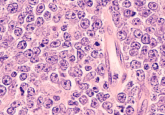Discover overall survival data from the ENDEAVOR trial: an interview with Meletios A. Dimopoulos

Multiple myeloma is an incurable blood cancer, characterized by a recurring pattern of remission and relapse. It is a rare and very aggressive disease that accounts for approximately 1% of all cancers. Recent research from the Phase 3 head-to-head ENDEAVOR trial, published in The Lancet Oncology, has yielded promising results for multiple myeloma.
Most notably the researchers observed that carfilzomib administered at 56 mg/m2 twice weekly and dexamethasone reduced the risk of death by 21% over bortezomib and dexamethasone, resulting in a 7.6 month overall survival benefit. We spoke with a key study investigator from the trial, Meletios A. Dimopoulos (National and Kapodistrian University of Athens, School of Medicine, Greece) to explore the trial in more detail and to discover the potential clinical application of its findings. If you would like to find out more about hematologic malignancies, make sure to check out our blood cancer page here.
Could you tell us about the treatment options for multiple myeloma patients?
Over the last 10 years and particularly the last 5 years, there has been a significant improvement in the treatment of multiple myeloma, with several new agents being approved by regulatory authorities.
At this point, we have several different drugs with different mechanisms of action to treat multiple myeloma, including proteasome inhibitors, immunomodulatory agents, steroids, chemotherapy and monoclonal antibodies.
Unfortunately, multiple myeloma remains a difficult disease to treat, with a small portion of patients being without progression for many years. The majority of patients relapse, and thus, we are in a constant need for novel therapies and more effective regimens.
Could you give us a brief overview of the ENDEAVOR trial? (background, patient population, end points)
The randomized phase III ENDEAVOR trial was a head-to-head comparison of carfilzomib administered at 56 mg/m² over a 30-min infusion twice per week with dexamethasone against bortezomib and dexamethasone in patients with relapsed or refractory multiple myeloma who had received between one and three previous treatments.
The first interim analysis of ENDEAVOR showed that progression-free survival was significantly longer with carfilzomib and dexamethasone than with bortezomib and dexamethasone, which was the primary endpoint of the study. The aim of this second interim analysis was to compare overall survival between the two treatment groups, a secondary endpoint of the study.
Results showed that median overall survival was 47.6 months (95% CI 42.5–not evaluable) in the carfilzomib group versus 40.0 months (32.6–42.3) in the bortezomib group (hazard ratio 0.791 [95% CI 0.648–0.964], one-sided p=0.010), a 7.6 month improvement. Carfilzomib and dexamethasone reduced the risk of death by 21% compared to bortezomib and dexamethasone. These results support the use of carfilzomib and dexamethasone as a standard of care for multiple myeloma patients at first relapse.
What advancements do you hope to see in the next 5–10 years regarding treatment options for multiple myeloma?
As mentioned above, we have several different drugs with different mechanisms of action to treat multiple myeloma. I believe that we are moving towards regimens that may include as many as four agents, each with a different mechanism of action, potentially in both the relapsed setting and newly diagnosed patients.
Any closing comments?
To my knowledge, carfilzomib is the first and only multiple myeloma treatment that has been shown to extend overall survival in the relapsed setting over a current standard of care. On the basis of these results, carfilzomib combined with dexamethasone should be considered a standard of care for patients with relapsed or refractory multiple myeloma.
 Profile: Meletios A. Dimopoulos, MD is Professor and Chairman of the Department of Clinical Therapeutics at the National and Kapodistrian University of Athens School of Medicine (Athens, Greece).
Profile: Meletios A. Dimopoulos, MD is Professor and Chairman of the Department of Clinical Therapeutics at the National and Kapodistrian University of Athens School of Medicine (Athens, Greece).
Financial disclosures/conflicts of interest: Dr. Meletios A. Dimopoulos has received consulting fees from Amgen.




